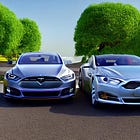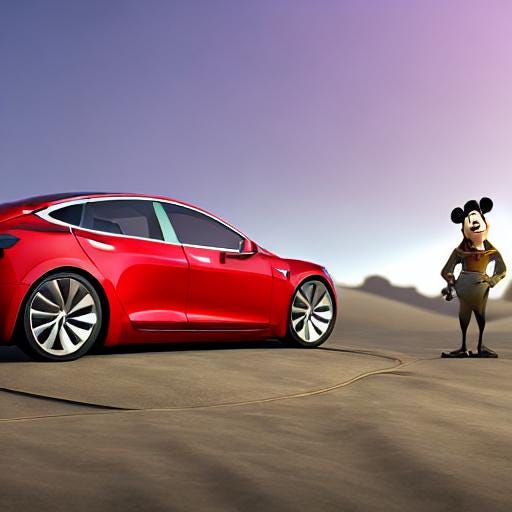Examining the Impressive Durability of High-Mileage Teslas in the UK
A deep dive into the remarkable resilience of high-mileage Tesla vehicles in the UK, with statistics and real-world experiences demonstrating their long-lasting batteries and low maintenance.
The rise of electric vehicles (EVs) has brought about a paradigm shift in the automotive industry. Among the leading brands in this revolution, Tesla stands out with its impressive range of high-performance electric cars. One of the key aspects that set Tesla apart is the impressive durability of its vehicles, even those with high mileage. This article delves into the resilience of high-mileage Teslas, particularly in the UK, backed by statistics and real-world experiences.
The Durability of High-Mileage Teslas
Tesla's electric vehicles, especially the Model S, have proven to be remarkably durable, even after covering hundreds of thousands of miles. A 2015 Tesla Model S 70D, for instance, was reported to have covered an astonishing 424,302 miles, approximately 71,000 miles per year, and was still going strong (1). The car had its battery replaced under warranty at around 250,000 miles, and the current battery pack had already covered 180,000 miles. Despite this high mileage, the car's original range of 240 miles only dropped to between 180 and 200 miles on a full charge, indicating a loss of around 25 percent (1).
Tesla's Battery Production
Tesla's battery production is a cornerstone of its electric vehicle (EV) and energy storage businesses(6). The company's approach to battery production is unique in several ways:
Gigafactories: Tesla's Gigafactories, located in various parts of the world, including Nevada, Shanghai, and Berlin, are central to its battery production strategy. These massive facilities are designed to produce batteries at an unprecedented scale, aiming to reduce costs and increase production capacity.
In-house Battery Cell Production: Tesla has been working on producing its battery cells. In September 2020, at the company's Battery Day event, Elon Musk unveiled the new 4680 battery cell, which promises higher energy density, longer range, and lower costs.
Battery Chemistry: Tesla continuously innovates in battery chemistry to improve performance, longevity, and safety. The company has been transitioning to batteries with less cobalt, a material associated with ethical concerns.
Battery Recycling: Tesla is also focusing on recycling used batteries. By recovering valuable metals from old cells, the company aims to reduce the environmental impact and costs associated with sourcing raw materials.
Battery Life and Replacement
The battery is the heart of an electric vehicle, and its health and longevity are crucial factors in the overall durability of the car. Tesla's batteries have shown impressive resilience, with some high-mileage Teslas reporting only minor decreases in range as the battery packs age. For instance, the range of a Tesla Model X dropped from 260 miles to 200 miles after 330,000 miles in service (2).
Tesla's CEO, Elon Musk, has stated that the current Tesla battery modules should last between 300,000 miles and 500,000 miles (4). This is a testament to the impressive durability of Tesla's batteries, which are a crucial component in the overall resilience of the vehicles.
Maintenance and Repair
Despite the high mileage, Tesla vehicles require surprisingly low maintenance. Apart from battery replacements, most high-mileage Teslas have needed only minor repairs and replacements. For instance, a Tesla Model 3 owner with over 100,000 km (62,000 miles) on the odometer reported only minor issues, such as paint defects and LTE data drops, which were promptly fixed by Tesla (5).
Tesla's Aftercare
Tesla's approach to aftercare and customer service is as innovative as its vehicles. Here's a breakdown:
Customer Support: Tesla offers comprehensive customer support covering purchasing, delivery, ownership, and product support. For roadside assistance, they have a dedicated support page. Tesla encourages scheduling service visits through the Tesla app, ensuring a seamless experience for the owner.
Vehicle Maintenance: Tesla vehicles require different maintenance compared to traditional cars. For instance, the cabin air filter replacement schedule varies based on the model. They also provide guidelines for tire rotation, brake fluid tests, and air conditioning service.
Mobile Service: Tesla offers two types of service appointments: Service Center visits and Mobile Service. If a service can be done outside of a Service Center, a Mobile Service Technician can come to the owner's location, adding convenience.
Aftersales Approach: Tesla's aftersales approach is transforming the automotive industry. Their vertically integrated aftersales service differs from traditional paradigms by eliminating third-party intermediaries and leveraging over-the-air (OTA) updates. This approach reduces reliance on physical service centres and introduces new revenue streams, such as subscription-based aftersales services. However, Tesla faces challenges, including potential regulatory pushback due to privacy concerns and the need to adapt its service strategy as more vehicles go out of warranty.
OTA Updates: One of Tesla's standout features is its ability to improve vehicles over the air. Tesla vehicles receive regular software updates that can enhance performance, introduce new features, and fix issues, all without the need to visit a service centre.
Feedback and Iteration: Tesla's close relationship with its customer base allows for rapid iteration based on feedback. This responsiveness has led to continuous improvements in both hardware and software aspects of their vehicles.
The Future of High-Mileage EVs
The impressive durability of high-mileage Teslas is a promising sign for the future of electric vehicles. With fewer moving parts, gaskets, fluids, belts, and maintenance items, it's no surprise that we're seeing high mileage EVs less than a decade old. This could potentially change the landscape of vehicle ownership and maintenance, with EVs offering a more reliable and cost-effective alternative to traditional internal combustion engine vehicles.
Conclusion
The impressive durability of high-mileage Teslas, backed by real-world experiences and statistics, is a testament to the quality and resilience of electric vehicles. With their long-lasting batteries and low maintenance requirements, Teslas offer a reliable and cost-effective alternative for those seeking a sustainable mode of transport. As the electric vehicle industry continues to evolve, the impressive durability of high-mileage Teslas sets a high standard for other manufacturers to follow.
(And we know you were wondering…)
The highest mileage Tesla in the UK, according to the Driver and Vehicle Standards Agency (DVSA), is a Model S that has covered over 377,989 miles (8). This is an impressive figure, considering the average car in the UK is driven about 7,400 miles per year. This Tesla has driven the equivalent of 15 times around the world, assuming that the battery hasn't been replaced and taking into account that it will have suffered degradation over its lifetime (8).
Sources
Here's What Happens to Tesla Electric Cars After 300,000 Miles
Tesla Model S durability: cars with 250K and 300K miles still humming
How Many Miles is Too Many on a Used Tesla? - Green Car Future
Tesla's EV Range Controversy: A Comprehensive Examination
In the rapidly evolving landscape of electric vehicles (EVs), Tesla has been a trailblazer, pushing boundaries and setting new standards. However, the company has recently found itself embroiled in a controversy that questions the driving range of its vehicles. This article aims to take a close look into the "Tesla EV range controversy", exploring the i…






piles of electric battery junk!
🤣🤣🤣🤣🤣